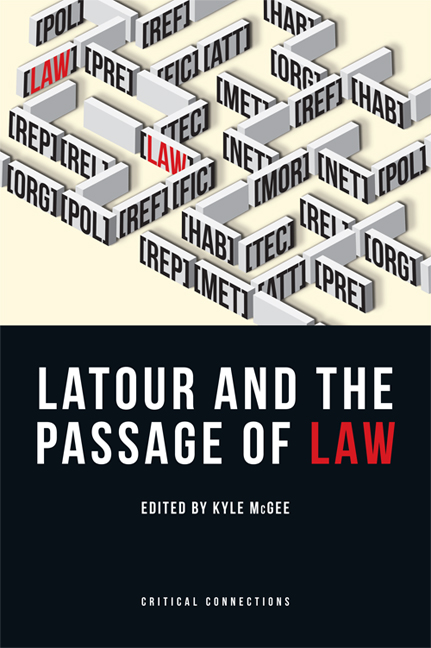Book contents
- Frontmatter
- Contents
- Introduction
- 1 From the Conseil d’État to Gaia: Bruno Latour on Law, Surfaces and Depth
- 2 Politics and Law as Latourian Modes of Existence
- 3 On Devices and Logics of Legal Sense: Toward Socio-technical Legal Analysis
- 4 ‘The Crown Wears Many Hats’: Canadian Aboriginal Law and the Black-boxing of Empire
- 5 Providing the Missing Link: Law after Latour's Passage
- 6 The Life and Deaths of a Dispute: An Inquiry into Matters of Law
- 7 Plasma! Notes on Bruno Latour's Metaphysics of Law
- 8 The Conditions of a Good Judgment: From Law to Internal Affairs Police Investigations
- 9 In The Name of the Law: Ventriloquism and Juridical Matters
- 10 Laboratory Life and the Economics of Science in Law
- 11 Bartleby, Barbarians and the Legality of Literature
- 12 The Strange Entanglement of Jurimorphs
- List of Contributors
- Index
1 - From the Conseil d’État to Gaia: Bruno Latour on Law, Surfaces and Depth
Published online by Cambridge University Press: 05 September 2016
- Frontmatter
- Contents
- Introduction
- 1 From the Conseil d’État to Gaia: Bruno Latour on Law, Surfaces and Depth
- 2 Politics and Law as Latourian Modes of Existence
- 3 On Devices and Logics of Legal Sense: Toward Socio-technical Legal Analysis
- 4 ‘The Crown Wears Many Hats’: Canadian Aboriginal Law and the Black-boxing of Empire
- 5 Providing the Missing Link: Law after Latour's Passage
- 6 The Life and Deaths of a Dispute: An Inquiry into Matters of Law
- 7 Plasma! Notes on Bruno Latour's Metaphysics of Law
- 8 The Conditions of a Good Judgment: From Law to Internal Affairs Police Investigations
- 9 In The Name of the Law: Ventriloquism and Juridical Matters
- 10 Laboratory Life and the Economics of Science in Law
- 11 Bartleby, Barbarians and the Legality of Literature
- 12 The Strange Entanglement of Jurimorphs
- List of Contributors
- Index
Summary
La fabrique du droit
In La fabrique du droit. Une ethnographie du Conseil d’État (now translated as The Making of Law), Bruno Latour reported on his months of first-hand observation of how law-making proceeded in the French Conseil d'Etat. One of the country's three ‘supreme’ courts – the others being the Cours de cassation and the Conseil constitutionnel – the Conseil d'Etat serves as a court on matters of administrative justice. In this role, it can satisfy a claimant by annulling a prior judgment by another court or tribunal or it can reject the claim. The court also acts as a legal advisor to government on the drafting of legislative bills and decrees. More rarely and if requested by the government – as in the ‘headscarf’ controversy – the Conseil d'Etat can proffer an ‘opinion’.
In selecting the Conseil d'Etat as his object of observation, Latour had picked a legal institution atypical of the French system. Founded by Napoleon, the court has ‘the task of conjuring up, from start to finish through the mere interplay of its previous decisions and in the absence of any written text … a sui generis form of law whose specific objective is to protect the citizen from the excesses of the administration’ (Latour 2002/2010: 14). The court's jurisdiction, then, is not code-based but rests its decisions on the authority of its own accumulated administrative case law.
Latour's account of the Conseil d'Etat's manner of proceeding went much wider than a concern with this institution's atypicality. The procedural and case-based – as opposed to code-determined – dimension of the court provided passage to a broader intellectual programme whose concern was to detour around conceptual determination. The outcome was a comprehensively ‘superficial’ description whose focus ranged from the judges’ particular habits of legal mind and their regular techniques of dealing with the cases coming before them to the architecture of the building and all the bits and pieces of equipment. This sweep – from the intellectual to the material, from the spiritual to the technical – is in keeping with the distinctive approach Latour has developed in his style of ‘science studies’ on the working practices of scientists and laboratories.
- Type
- Chapter
- Information
- Latour and the Passage of Law , pp. 17 - 37Publisher: Edinburgh University PressPrint publication year: 2015

